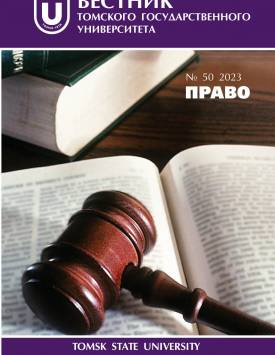Extrajudicial procedures to curb the spread of piracy on digital platforms: ensuring a balance of interests
The article analyzes out-of-court procedures aimed at suppressing the distribution of pirated content on digital platforms. Legal regulation in this area is considered through the prism of the correlation of the constitutional right to freedom of information exchange with the right to freedom of creativity and protection of intellectual property. It should be said that the discussion itself about the extent to which the possibility of free dissemination of information can be limited is not new and has been a companion of copyright since its inception. Meanwhile, with technological development and the emergence of new means of communication, it is only getting worse. At the same time, the conflict between the right to freedom of information dissemination and copyright can be resolved if we depart from the paradigm of protecting property interests in copyright and consider it as a means of streamlining information exchange. When talking about mechanisms for the extrajudicial suppression of copyright and related rights violations on digital platforms, it is necessary to take into account the balance of interests of all interested parties, recognizing as such not only copyright holders and authors, but also users and intermediaries who own digital platforms. The authors note that the emergence of extrajudicial procedures for blocking and deleting pirated content was the result of special regulation of the responsibility of information intermediaries. These rules have forced digital platform operators to create special procedures for reviewing copyright holders' claims. An offshoot of this procedure was the anti-piracy memorandum, which allows you to remove links to pirated content from search results. A common disadvantage of all non-judicial procedures for the suppression of violations in the field of copyright and related rights is that they ignore the interests of users. When establishing and implementing such procedures, only the interests of copyright holders and owners of digital platforms are taken into account. Users are disenfranchised under such procedures and are effectively deprived of the ability to protect themselves from unjustified blocking on the platform and deleting information from search results. According to the authors, such a state of affairs cannot be justified due to the consolidation in article 29 of the Constitution of the Russian Federation of the right to free search and dissemination of information. As a measure aimed at taking into account the interests of users, it is proposed to provide for a judicial challenge of blocking by operators of digital platforms, as well as the introduction of a declaratory claim for nonviolation of an exclusive right to the copyright holder. The authors declare no conflicts of interests.
Keywords
copyright, piracy, blocking of information, digital platforms, information intermediariesAuthors
| Name | Organization | |
| Kozhemyakin Dmitry V. | Tomsk State University; Volgograd Institute of Management is a branch of the Russian Presidential Academy of National Economy and Public Administration | i@dv-k.ru |
| Koverchenko Ivan I. | Volgograd Institute of Management is a branch of the Russian Presidential Academy of National Economy and Public Administration | vankover091@gmail.com |
References

Extrajudicial procedures to curb the spread of piracy on digital platforms: ensuring a balance of interests | Tomsk State University Journal of Law. 2023. № 50. DOI: 10.17223/22253513/50/10
